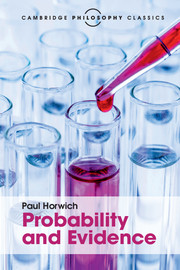Summary
There is no shortage of objections in the philosophical literature to the general strategy and the particular concepts which have been employed here. Some of these complaints have been aired in previous chapters and, I hope, defused. In particular, I have nothing to add to the earlier arguments, in Chapter 2, for the existence of degrees of belief and their conformity to the probability calculus. Let me simply repeat what I think are the main considerations which help to allay criticism of those ideas. (l) A respectable concept need not be operationally definable. (2) The present notion of subjective probability was designed only to provide a perspicuous representation facilitating the exposure of confusion, and is not intended to serve the needs of psychology, the history of science or any other discipline.
However, there are several perspectives opposed to my approach which have not yet been explicitly addressed, and I would like in conclusion to respond directly to some of them. I will begin with Popper, who has been perhaps the most prominent and persistent opponent of Carnap-style probabilistic inductivism. Then I will discuss the bearing of Bayesianism upon the realism/instrumentalism controversy. Thirdly, I will examine an ingenious argument due to Putnam and intended to produce dissatisfaction with probabilistic confirmation theory. Finally, I will consider the criticisms of Bayesianism which motivate Glymour's ‘bootstrap’ conception of evidence.
Popper
According to Popper (1972) we ought never to believe that a general explanatory theory is true, or even probable; but we may often come to know that such a theory is false – when it conflicts with our data. Rational scientific inquiry proceeds by the formulation of bold (= contentful = easily falsifiable = intrinsically improbable) conjectures, by their subjection to rigorous experimental investigation, and by the invention of new hypotheses to resolve the problems, yet preserve the merits, of those which have been refuted. Progress consists in the growth in our knowledge of which theories are false, and in the increasing corroboration (survival through severe tests) of those which are as yet unfalsified, and which might therefore be true.
- Type
- Chapter
- Information
- Probability and Evidence , pp. 121 - 132Publisher: Cambridge University PressPrint publication year: 2016

